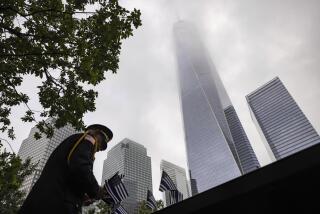Guilt and Separation Anxiety Surround a Moving Experience
- Share via
A year ago, the Sept. 11 attacks prompted an exodus from New York City, especially among downtowners who couldn’t or wouldn’t inhabit the Dead Zone. For me and many others, it was the opposite. Sept. 11 compelled us to stay.
Solidarity kicked in. We purchased and wore American flags and “I Love New York” T-shirts. We assailed our local fire stations with wreaths and cards, and we spent what money we had in restaurants and shops south of 14th Street. We hung tough and got on with it because that’s what New Yorkers do.
Well, sort of. Now, after putting in a year’s worth of sedentary support for my city, I am leaving. Sept. 11 didn’t have anything to do with my decision--I’m going because of my partner’s job--but it certainly has had a considerable effect on how I feel about the move.
I feel guilty, like a rat jumping ship. If the “10 Suburbs You Can Afford” cover story in this week’s always trendy New York magazine is any indication, absconding is also on the minds of a lot of my fellow Gothamites.
To some degree, it always has been. The city’s well-to-do, including many who worked in the World Trade Center towers, long have sought refuge in commutable bedroom communities.
But now people relocating north and west of the Hudson have a tinge of the traitor about them, or at least some of us think we do. I, for one, know I’ve taken a lot from my Lower East Side neighborhood during a very prosperous period in its history, and now I’m leaving it just when it seems to need me the most.
When I came to New York in 1994, Mayor Rudolph Giuliani’s term was just beginning. The city embarked on a renaissance. Crime rates fell to 20-year lows, and the bull market ran so long and hard that Wall Street seemed like Pamplona. Restoration turned the once-tawdry Times Square area into a theme park and transformed drug-ridden neighborhoods like my own into resorts. By 2001, New York was beguiling again.
The terrorist attacks changed all that. In some buildings near ground zero, half the tenants left within weeks of the attack. Landlords had to drop rents precipitously to fill the vacancies. Even so, real estate brokers say the downtown rental market is 10% below what it was before Sept. 11.
Meanwhile, nearly half of the companies that lost office space Sept. 11 have opted not to return to Lower Manhattan. Restaurants and nightclubs have closed or seen sizable declines in their business.
All that adds up to lost jobs, lost revenue, lost disposable income in a city whose debt this year is almost as high as it was during its fiscal crisis in 1975.
What Sept. 11 did to New York sounds a little like what white flight did to many of our nation’s inner cities, and yet so many of us are fleeing anyway, leaving the neighborhoods that, in my case at least, nurtured and inspired us.
Sure, New York will bounce back without us. It always has. With 20% of Manhattan’s population turning over every five years, there’s always a fresh crop of new arrivals to invigorate this town. But when you leave a place after it has suffered the most devastating attack in its history, you feel a sense of disloyalty, even failure.
But that is the price this city has always exacted from its expatriates. It keeps you as one of its own, yet it goes on without you all the same. And that is its own form of punishment.
More to Read
Sign up for Essential California
The most important California stories and recommendations in your inbox every morning.
You may occasionally receive promotional content from the Los Angeles Times.













